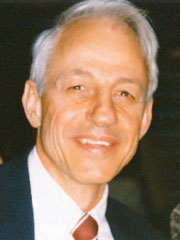
William A. Bernhard Memorial Lab
Welcome to the Bernhard Memorial Lab

In Memory of William Bernhard, PhD (1942-2012)
Dr. William A. Bernhard, Professor of Biochemistry and Biophysics at the University of Rochester, and past president of the Radiation Research Society, died peacefully, May 9 at his home in Mendon, NY. Dr. Bernhard was an internationally known expert on the effects of ionizing radiation on the chemical structure of DNA.
Dr. Bernhard earned his B.S. degree in Physics at Union College in 1964, and his master’s and doctoral degrees in Biophysics at Penn State University in 1966 and 1968. Dr. Bernhard then received postdoctoral training at the Argonne National Laboratory from 1968–1970. He joined the faculty of Biophysics at the University of Rochester as an assistant professor in 1970 with an NIH Career Development Award. He was appointed professor of Biophysics in 1985. He served as associate chair or co-chair of the Department of Biochemistry and Biophysics from 1996 to 1998.
Dr. Bernhard was a biophysicist of the highest order, working at the forefront of understanding how radiation damages our genetic material. His unique command of both the biological and physical aspects of radiation damage earned him the respect and recognition of colleagues worldwide. The longevity of his research program, funded by the National Cancer Institute for 37 consecutive years, and the successful careers of his many trainees are testaments to the consistent high quality of his work, the high regard his peers, and his commitment to training future scientists. Bill also was a wonderful person and colleague. His kindness to his colleagues and passion for his work made him a trusted friend and ideal colleague.
His renowned research program has focused on understanding the physical and chemical processes by which radiation affects biomolecules, especially DNA. His results have helped guide industrial and government policies regarding radiation risk assessment and have provided critical details to predict the biological consequences of radiation and understand DNA damage mitigation and repair processes.
Throughout his career, Bill was committed to mentoring and developing young scientists, and he felt strongly about investing in people and their careers. Bill was the Ph.D. thesis supervisor for 14 students. He had 9 post-doctoral students, and worked with 2 research assistant professors. Many of these former co-workers have moved on to academic positions and are doing research in radiation damage studies in DNA.
Bill’s contributions to radiation chemistry went beyond his published works. His presentations at meetings and conferences were always models of clarity and insight. It was impossible to attend one of his talks without learning something new. This, in a way, was also a show of respect and affection for both his colleagues and for his field of research.
Bill was a biophysicist of the highest order, working at the forefront of understanding how radiation damages our genetic material. His unique command of both the biological and physical aspects of radiation damage earned him the respect and recognition of colleagues worldwide, said Jeffrey J. Hayes, Ph.D., chair of the Department of Biochemistry and Biophysics. The longevity of his research program, funded by the National Cancer Institute for 37 consecutive years, and the successful careers of his many trainees are testaments to the consistent high quality of his work, the high regard his peers, and his commitment to training future scientists. Bill also was a wonderful person and colleague.
For more information on Dr. Bernhard and his research please continue reading the Radiation Research article and browse the list of his publications.